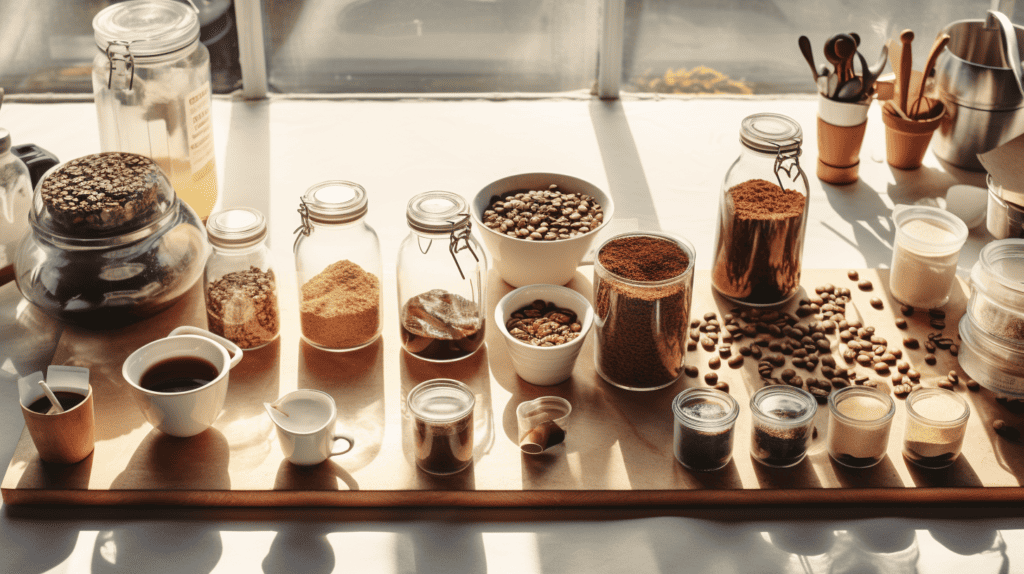Have you ever wondered what the best way to drink coffee is? I’ve asked the same question, especially after discovering that 75 potential benefits may come from optimal coffee consumption.
This blog post will serve as a comprehensive guide to help us navigate the best practices for drinking coffee – from brewing methods to possible health boosters. Dive in, because your perfect cup awaits!
Key Takeaways
- Limit your caffeine intake after 2 P.M. for better sleep and overall health.
- Avoid adding excessive sugar to your coffee to prevent weight gain and promote a healthier lifestyle.
- Choose a high – quality, preferably organic brand of coffee for better taste and environmental sustainability.
- Use paper filters when brewing coffee to remove oils and sediment from the grounds.
Healthier Coffee Habits
To promote a healthier coffee routine, it’s important to limit your caffeine intake after 2 P.M., avoid adding excessive sugar to your cup of joe, and choose a quality brand that preferably uses organic beans.
Limit caffeine intake after 2 P.M.
To promote better sleep and maintain your health, it’s beneficial to curtail your caffeine intake after 2 P.M. Caffeine consumed at this time can interfere with the natural internal clock of our bodies because it stimulates a feeling of alertness that mimics daylight.
This stimulant effect suppresses melatonin, a hormone that signals our body when it’s time to relax and head towards sleep mode. Even if you feel sleepy at night, caffeine intake past afternoon might make you spend more hours tossing and turning before finding deep restorative sleep.
You’ll be amazed by how much an early coffee cut-off can improve the quality of your slumber!
Avoid adding excessive sugar to your coffee
One of the best ways to enjoy a healthier cup of coffee is by avoiding excessive sugar. While it may be tempting to sweeten your brew, adding too much sugar can lead to weight gain and potential health issues.
Instead, try experimenting with alternative flavors like cinnamon or cocoa for a naturally delicious taste. Not only will this help you cut back on added sugars, but it can also add an extra layer of depth to your coffee experience.
So next time you’re reaching for the sugar jar, consider opting for a spice instead and savor the true flavors of your favorite roast without any unnecessary sweetness.
It’s important to remember that excess sugar consumption can have negative effects on our overall well-being. Reducing or eliminating added sugars in our daily coffee routine can make small but impactful changes towards a healthier lifestyle.
Choose a quality, preferably organic brand
I always make sure to choose a high-quality coffee brand, preferably organic. By selecting a quality brand, I can ensure I get the best taste and aroma from my cup of coffee.
Organic brands are also free from harmful chemicals and pesticides, making them a healthier choice for me and the environment. Plus, supporting organic coffee farmers helps promote sustainable agriculture practices.
So, when it comes to enjoying my daily dose of caffeine, I believe in choosing a quality brand that aligns with my values.
Practice moderation in consumption
I always remind myself to practice moderation when it comes to consuming coffee. While coffee can provide various health benefits, too much of it can have negative effects on your well-being.
It’s important to be mindful of your caffeine intake and not overdo it. Remember that the recommended daily limit for caffeine is about 400 milligrams, which is equivalent to about four cups of brewed coffee.
By practicing moderation, you can enjoy the benefits of coffee without going overboard and potentially experiencing adverse effects.

Add cinnamon or cocoa for additional flavor
When looking to enhance your coffee’s flavor, you can try a few simple and healthy options. Add cinnamon or cocoa for an extra kick of flavor that will take your coffee experience to the next level.
- Sprinkle a pinch of cinnamon into your coffee grounds before brewing. This will infuse your cup of joe with a warm and aromatic flavor that pairs perfectly with the natural bitterness of coffee.
- If you’re craving something sweeter, mix in a teaspoon of unsweetened cocoa powder to your brewed coffee. This will give it a rich and slightly chocolatey taste without adding excessive calories or sugar.
- For an indulgent twist, combine both cinnamon and cocoa together in your cup of coffee. The combination of these two flavors creates a harmonious blend that is sure to satisfy any cravings.
- If you prefer creamer in your coffee, consider opting for a cinnamon or chocolate – flavored variety as a healthier alternative to sugary options. These flavored creamers can still add sweetness and complexity to your brew without the guilt.
Optimal Brewing Methods
Use a paper filter for brewing, as it helps to remove oils and sediment from the coffee grounds.
Use a paper filter for brewing
When brewing your coffee, using a paper filter is the way to go. Paper filters help remove oils from the coffee grounds, resulting in a cleaner and smoother cup of joe. It also helps to reduce the amount of cholesterol-raising compounds found in coffee.
So, if you want a healthier and less bitter-tasting brew, don’t forget to use a paper filter when making your morning coffee.

Consider alternative brewing methods such as French press or pour-over
When it comes to brewing coffee, alternative methods can enhance your coffee-drinking experience. Here are a few options to consider:
- French Press: This method involves steeping coarsely ground coffee in hot water for a few minutes before pressing down a plunger to separate the grounds from the liquid. It results in a full-bodied and flavorful cup of coffee.
- Pour-Over: With this method, you pour hot water over a filter containing finely ground coffee beans. The water drips through the grounds and into your cup, producing a clean and vibrant brew.
- Aeropress: The Aeropress combines elements of both French press and espresso brewing methods. It uses air pressure to extract flavors quickly, resulting in a smooth and rich cup of coffee.
- Cold Brew: Cold brew involves steeping coarse coffee grounds in cold water for an extended period, usually overnight. The result is a deliciously smooth and less acidic iced coffee that you can enjoy on hot summer days.
Avoid low-fat and artificial creamers
I always steer clear of low-fat and artificial creamers when it comes to my coffee. These options may seem convenient, but they often contain additives and unhealthy ingredients that can actually detract from the overall quality of your cup of joe.
Instead, opt for natural alternatives like whole milk or even non-dairy options such as almond or oat milk. These choices not only provide a creamy texture but also offer additional nutrients without unnecessary additives.
So next time you reach for a creamer, consider healthier alternatives that will enhance your coffee-drinking experience.
Health Benefits of Black Coffee
Drinking black coffee offers numerous health benefits, including potential weight management advantages.
Benefits of drinking coffee without any additives
Drinking coffee without any additives can offer a range of benefits. When you enjoy your coffee black, without adding sugar, creamers, or syrups, you’re consuming it in its purest form.
This means you’ll experience the full flavor and aroma of the coffee beans themselves. Also, drinking black coffee can help reduce your calorie and sugar intake. By skipping the additives, you’ll fully appreciate the natural bitterness and complexity of the brew.
So next time you reach for a cup of joe, consider enjoying it as nature intended – plain and simple.
Potential weight management benefits
Drinking coffee can potentially aid in weight management. When consumed without any additives, such as sugar or creamer, black coffee is low in calories and can help suppress appetite.
Additionally, caffeine found in coffee has been shown to boost metabolism and increase fat burning. Incorporating black coffee into your routine may support your weight loss goals as part of a balanced diet and active lifestyle.

Exploring Alternative Milk Options
Regarding alternative milk options, plant-based milks like almond milk, oat milk, and coconut milk can be great choices for those looking to reduce their dairy intake.
Trying plant-based milk as an alternative to dairy
I’ve discovered that trying plant-based milks is a great way to make my coffee healthier. Not only do they offer a range of flavors, but they also have their own unique health benefits. Here are a few options to consider:
- Almond milk: It adds a subtle nutty flavor to your coffee and is low in calories. It’s also rich in vitamin E and calcium.
- Soy milk: This creamy alternative is high in protein and can give your coffee a smooth texture. Plus, it contains essential amino acids.
- Oat milk: With its slightly sweet taste, oat milk can enhance the flavor of your coffee. It’s also packed with fiber and beta-glucans, which may help lower cholesterol.
- Coconut milk: For those who enjoy a tropical twist, coconut milk is a delicious choice. It’s rich in healthy fats and may even boost heart health.
Considering the flavor and health benefits of each option
When choosing alternative milk options for your coffee, it’s important to consider both the flavor and the health benefits. Here are some popular choices to explore:
- Almond milk: This creamy and nutty milk adds a subtle sweetness to your coffee. It is low in calories and contains beneficial nutrients like vitamin E and calcium.
- Coconut milk: With its tropical flavor, coconut milk pairs well with specialty coffees. It can provide a rich and creamy texture, but be mindful as it does have higher fat content compared to other options.
- Oat milk: Made from oats, this plant-based milk has a slightly sweet taste that complements coffee perfectly. It is also high in fiber and contains essential vitamins such as B12.
- Soy milk: Known for its neutral flavor, soy milk blends well with coffee without altering the taste too much. It is a good source of protein and can provide additional vitamins such as riboflavin and folate.
- Cashew milk: Creamy and smooth, cashew milk creates a velvety texture in your coffee. It is relatively low in calories and offers heart-healthy fats along with magnesium and iron.
Conclusion on Best Way To Drink Coffee 💭
To enjoy the best cup of coffee, it’s vital to develop healthier habits. Limit caffeine intake after 2 P.M., avoid excessive sugar, and choose a quality brand. Optimal brewing methods like using paper filters or trying alternatives such as French press can enhance your coffee experience.
Consider the health benefits of black coffee and explore plant-based milk options for a healthier twist. By making these choices, you’ll be able to savor the delightful taste of coffee while also taking care of your well-being.
FAQs on Best Way To Drink Coffee
1. How should I prepare coffee for the best taste?
For the best-tasting coffee, grind fresh beans and use them immediately before brewing. Use filtered water and a proper coffee-to-water ratio to extract maximum flavor.
2. Is it better to drink coffee black or with cream and sugar?
The choice of drinking coffee black or with cream and sugar is subjective. Some prefer the pure taste of black coffee, while others enjoy adding cream and sugar to customize the flavor according to their preferences.
3. What is the recommended amount of caffeine intake from coffee per day?
The recommended daily caffeine intake from coffee varies depending on personal tolerance and health factors, but generally, it’s advised not to exceed 400 milligrams (mg) or about 4 cups of brewed coffee per day.
4. Can I reheat leftover brewed coffee?
While it is possible to reheat leftover brewed coffee, it may result in a less desirable taste as reheating can make it bitter or flat. It’s best to brew a fresh cup whenever possible for optimal enjoyment.





Leave a Reply